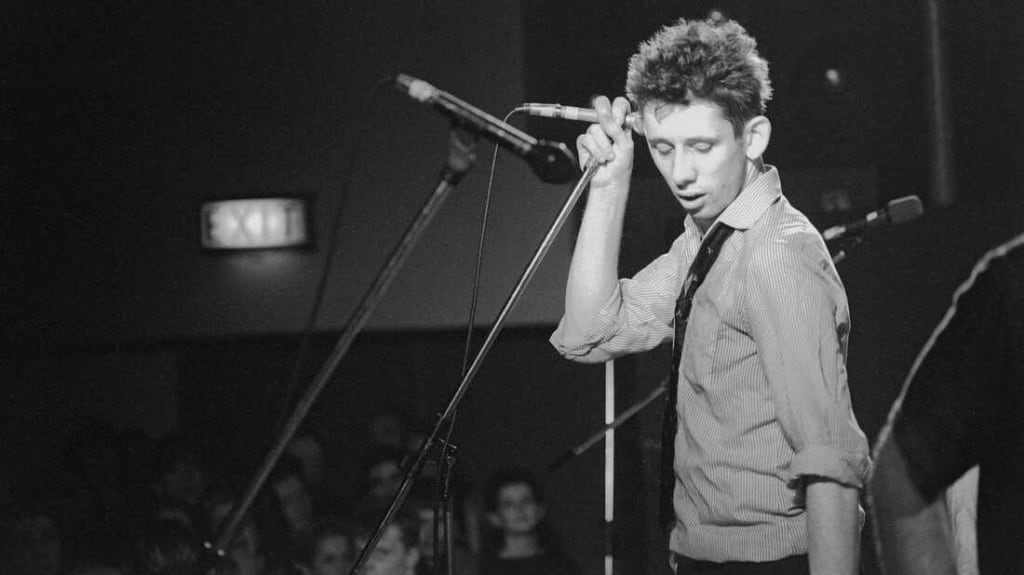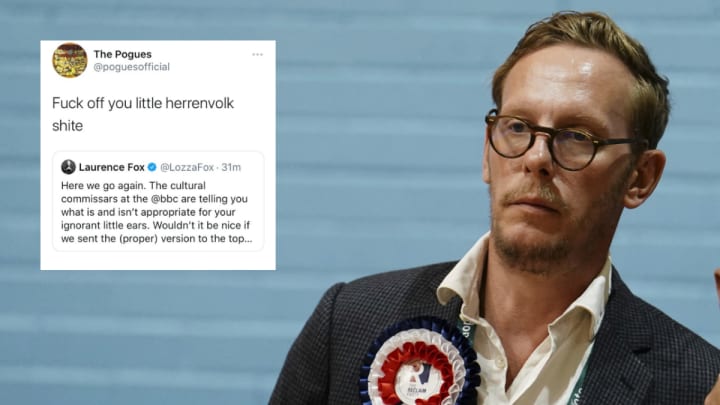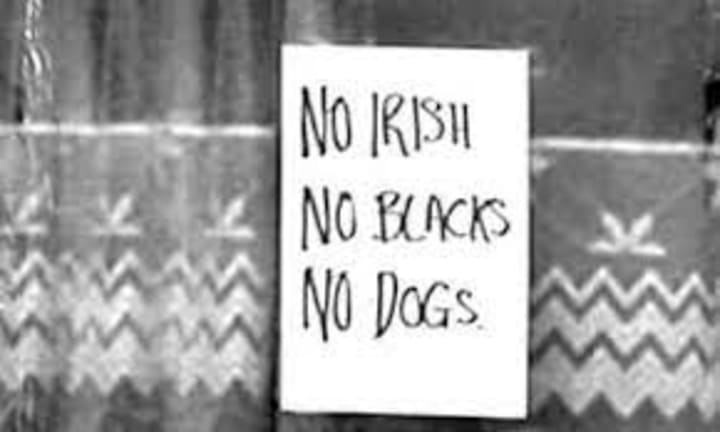There's a light I hold before me
Personal essay: A thematic playlist in memory of Shane MacGowan and some aimless commentary.

May the ghosts that howled ‘round the house at night / Never keep you from your sleep / May they all sleep tight down in hell tonight / Or wherever they may be... [Lullaby of London : MacGowan, 1988]
When I heard the news of Shane MacGowan's death this morning, I felt that gut-punch of grief that can only come from knowing that an artistic voice who *got* you has passed on.
It's an odd feeling; a rush of uncomplicated grief that is as comforting as it is regretful. This artist was a part of you; a pillar of your self-identity and tastes. Their loss feels like a loss of a part of yourself. The world can feel a bit lonelier, and make a bit less sense.
These artists are our guides. They lead us through the unseen terrors with magic that speaks directly to our souls. "This way," they said to our hearts, once, and now that voice is gone.
What's worse is that this phenomenon can appear to happen in batches. 2016 was a year like that. 2023 has tried its best. The passing of Sinéad O'Connor was a devastating loss, and now Shane MacGowan. The Irish musicians who were idols to me seem to be slipping away.
These thoughts hit me like a brick as I sat in my pyjamas, blinking tears onto my phone. My partner, who lives on a Zoom call at present, had gone about their business, leaving me quite happy, hairy and bored. Now I was a filmy mess of tears and face-paste. It had taken about a minute.
That's how important these artists to us.
***
You might not know very much about Shane MacGowan. A lot of you will know a certain Christmas song, and remember the odd-looking guy in a suit with a voice that sounds like a drunken chainsaw fucking a rusty bear in a tar pit. You might know that he's Irish. You might like a few Pogues hits. Some will remember his teeth. Most will remember booze.
***
After I had calmed down a bit, had several pints of tea, and been accepted/rejected a few times by my cat, I started to get a sense of the comments I was seeing, and what Shane meant to people. As I was pondering, the Irish side of me began screaming for some sort of party. We wake our dead. We kick up a fuss of love to make sure they're remembered. Our dead don't really die.
So... let's do that! I won't speak too much of the man himself - other, better, voices can do that - but rather, I'd like to discuss what he told us in his songs.
Here's a little playlist that I think captures some of the major themes that Shane MacGowan captures in his* songwriting.
(*Please note that Shane was a collaborator as much as a solo artist, and so many songs, especially written during the Pogues days, are co-written. When I refer to MacGowan's songwriting, please understand I can also mean as part of a collaboration and will credit where due.)
***
The Irish Diaspora and Irishness.
We'll start sad. It's a sad day.
To understand Shane MacGowan, first of all, you need to understand Diaspora na nGael, the Irish Diaspora. Many cultures (victims of European rapacity) have a Diaspora, a scattering of peoples. Traditionally we never called ourselves 'emigrants' - we were 'exiles'. The Irish are a displaced tribe; we were forced to leave.
Invasions, massacres, ethnic cleansing, poverty, religious authoritarianism and reprisals are the cultural touchstones of our history; alongside the songs and poetry; the gods and Good Neighbours. The bloody sword of Cromwell, the clearing of homes for cattle and the sear of the Blight smell on a starving belly walk through our collective memories like living lore.
At it's peak, the population of Ireland never exceeded 8.5 million people, and following an Gorta Mór ('the Great Hunger' - the Irish Potato Famine of 1841-53) - which was only the largest one of a series of countrywide famines - the population fell...and fell. Death and displacement in history means that our population has never recovered since the levels there were at...in 1841. These famines were the direct result of colonialism and ethnic cleansing.
There are over 85 million Irish abroad today. And for each of those people - there was an Irish person with a song who stepped aboard a boat.
Shane sang for them.
'Thousands are Sailing' (Chevron, 1988).
The Underdog, Duality of Man and Injustice
With a sense of injustice and a living memory of oppression, it is perhaps unsurprising that the raw talent of MacGowan's songwriting leant its sympathies to the Oppressed.
We hear a lot of references to 'national values' these days. These are, of course, impossible things to quantify. Shane MacGowan and the Pogues came close though: they articulated an element of the Irish national spirit that many (including, unfortunately, Irish Americans) have seemed ignorant of until quite recently, as global injustice, and the west's appeasement of colonial genocide show how binary the issue is:
The Irish find it nearly impossible to sympathise with, enable, support or cheer on the Bully, the Fascist or the Occupier*.
(*wiiiiiiiiiiiiiith the exception of the Roman Catholic Church - the great Colonial Cheerleader of All Three - who, for some reason, everyone seems to forget...)
A song that captures this perfectly for me is Lorca's Novena (Finer/MacGowan, 1988). This haunting dirge, understruck with a rattlebone snare, marches us, like a grinning skeleton, through the cruelties of man. Federico Garcia Lorca was a queer communist poet whose words spoke of the hopes and dreams of the burgeoning Spanish Republic in 1936. When the fascist forces of General Franco murdered Lorca, they killed more than a man. They killed the innocence of a movement. It is not an anthem for vengeance. The song is a prayer to save that innocence.
It is a lament, in the gear of war. It is sad, and grim and willing to do anything to tell this truth. That 'Lorca the fagg*t poet' is a beloved child of the Mother is self-evident. Ideas and arts are sacred. Humans are messy and mortal. As MacGowan snarls and rasps at the fascist cowards, we learn that Lorca is, of course, not at all dead. Arts cannot be killed.
A funny little aside - The Pogues have never allowed their name or work to be used as a political football, and have evinced a straightforward approach to calling out intolerance. They have always owned their politics. I admire their approach, as spectacularly shown here when dubious-matter-container Laurence Fox tried to politicise the band's choice to remove the F word from 'Fairytale of New York':

With the anger of the past comes the desire for vengeance. It is natural and human. MacGowan, who oft supped with his demons, knew this about his own people, our angry tribe; we can be motivated by hate as equally as by love.
MacGowan was born in London, the son of Irish parents who had immigrated to rebuild a Britain that had been bombed flat by the Luftwaffe. They were second class citizens, yet he was born there. It would be confusing for anyone: an Irish boy born in England. That duality could only be reinforced by the fact that, for the Irish in England, the immigrant was forced to cooperate and assimilate with the society whose historical actions had set in gear the necessity for economic migration: a fact that would never be acknowledged. Everyday hatred against the Irish was commonplace; as it was for many 'outside' people. Afro-Caribbean immigrants and their Irish neighbours were likened together as undesirable by the right-wing media who normalised xenophobic violence. For many Irish people (most of whose were white), this 'outsider' status was relatively forgotten after a generation, and so first generation Irish-Brits would find themselves enmeshed in the systems and bureaucracy of oppression. This collaboration can further isolate an exile from their sense of identity.
I imagine that for some, such dualities; being the victim and part of the oppression; being Irish in every element but for location of birth etc, could cause conflict in a young mind without an outlet.
MacGowan had two: Irish traditional music and punk.

TW: I'm essentially a death-barnacle in terms of grimdark, but this song is even a bit salty for me, so fair warning:
MacGowan lays out his Enemy here: The exploiter is the enemy; the soldier, the blueshirt (Irish 1930's fascist). The enemy is all systems of oppression and objectification and violence and opportunism and exploitation. The enemy is the narrator himself here. How easy it is to become the Oppressor - he wants us to remember that.
The narrator has been rendered heartless by casual cruelty.
"The boys and me are drunk and looking for you. / We'll eat your frigging entrails, and we won't give a damn."
There are only a few degrees of variation between a choir of voices and a mob of fists.
Hatred and Oppression lead to war. It is a topic that haunted MacGowan's work. From the Spanish Civil war to Vietnam, from Galipoli to the GPO in Dublin, war is ever present; a sick byproduct of empire.
The boys who believe the great war songs will fall, just as they always have. The heart breaking waltz A Pair of Brown Eyes (MacGowan, 1988) tells this familiar tale all too well.
Here, the living legend that is Christy Moore sings with MacGowan:
(Also, how fucking wicked was that laugh!)
Revenge for Skibereen, London, movement.
Once the emigrant has left for the first time, they will always move. As an exile, I can promise it.
MacGowan was an Irishman and a Londoner. The London-Irish community is so deeply rooted and linked to the old country that the community is often seen as a separate county (albeit a separate county with a population greater than Ireland ever had).
Dirty Old Town (McColl 1985)
(This tune was written by Ewan McColl, whose daughter Kirsty comes into this story in a bit.)
MacGowan's London songs are without a doubt my favourite. They conjure an image of a seedy, corrupt, violent, greedy, messy and beautiful world. The troubles of life dance along with the smell of alley-piss and the petrichor of sun-dried puddles. It is Catholic Richard Curtis. Everyone is a bit doomed and a bit loveable. Life takes place on the fringes; in the bookies and the pubs, in the doorways. It takes place in embarrassing conversations and small hypocrisies and casual cruelties and self-destruction. The streets are not paved with gold - they are cold and lonely, and sometimes the only shelter in life. The subjects of these songs are trapped by life and either survive or don't. They aren't judged. They are just witnessed.
Rain Street (MacGowan, 1990)
Father John has the clap again and he's drinking Coca Cola...
When he sings of Ireland, we may think of a picture postcard of Ireland, but that's not it. He presumes that you know the weight of Irish history - WHY we might want revenge for Skibereen. He presumes you know of the soul-gnawing hunger to return to the land that was forsaken us. He presumes that you know about the weight. We can acknowledge it.
The Ireland that MacGowan sings of is within. It consists the land, of course, but only to an extent. The Ireland of McGowan's poetry is encoded into the DNA of the songs, art and fury of the people; it is cultural expression, emotion and tribe as one.
He's interested in the people; in their hearts and horrors. He wants to understand and shine a light on our glorious littleness.
Fiesta
Anecdote:
My best friend growing up had a big brother named Conor (it's a very common name in Derry). C worked in the nearby restaurant bar, and one night he had Shane MacGowan as a customer. Shane was playing with his new band, the Popes, in the Rialto Theatre, having been kicked out of the Pogues for tomfoolery. He was drunk.
"Giz a large Bailey's please, mate."
C took a glass to the optic and began to push out two measures. He brought it back.
"Keep going, my friend."
C repeated this step until the tumbler looked ready to overflow.
"Put it in a larger glass, please mate."
C apparently reached for the nearest glass, a Guinness pint glass.
"Keep going."
In the end, C handed Mr MacGowan a pint glass full of Bailey's.
"Sure, I could have just sold you a bottle."
"Then that way, the tip wouldn't be so big."
He dropped a 50 and walked away.
***
Shane was a drinker for most of his life. A heavy boozer of the type that only seems to exist in talk-show recollections and in memoriam sections of national newspaper sites. He was, frankly, lucky to reach 65 years of age. As a person with issues around sobriety and misuse, I relate to this, and love him all the more for it. He was unapologetic in his drinking. It was a fact of his life, as much as his teeth and his voice. I sorta love that.
Alcohol is a central character in the poetry of MacGowan - it is a muse and a comfort; a liberator and a millstone. Without it, it is hard to imagine that MacGowan might have found the messy liquidity that he needed to gather the disparate elements of himself into art.
Alcohol is neither friend nor foe, and can take a life as easily as it can inspire a love-song.
Jimmy drank until he choked, and took the train for heaven in the morning.
This fatalism is given a cheerful rendition in pub-favourite Sally McLennane (MacGowan, 1985)
The Serenity of Damnation Accepted
Death and Hell are a part of the life of MacGowan's songs, so it's no surprise that themes of Catholicism are never far from the surface. The spirits of the dead are unquiet, the land is hungry. The imagery and incense smell that is present in the songs approach damnation with a fatalism that I adore.
If I Should Fall From Grace With God (1988, MacGowan)
We're fucked anyway, so we might as well accept ourselves.
Tied all up with love.
The best Pogues songs are love songs that tie up all the other themes I have discussed. Love is something we can do, in spite of the fact that that we are a doomed species. It is the only thing worth striving for.
A Rainy Night in Soho (1985, MacGowan)
No song encapsulates the Pogues, and MacGowan, more than A Rainy Night in Soho. The narrator is cold, vulnerable, in need of shelter. Love is a comfort and a constant in a world where nothing is certain.
We watched our friends grow up together / And we saw them as they fell / Some of them fell into Heaven / Some of them fell into Hell
We can find love, in spite of it all. In a doomed existence; love - all sorts of love - is the only thing really worth anything.
The Fairytale of New York (Finer/MacGowan 1988)
With one exception, no other Christmas single has captured the public imagination quite like A Fairytale of New York. The exception is of course Mariah Carey's 'All I want for Christmas is You'. That plague-song aside, no other single has had quite the same level of respect and acclaim. Why?
I think the 'why' of the song's success is both simple and complicated. Firstly, it's just a brilliant tune. From the immediate nostalgia of those opening piano chords, it is a tune that stills the time around you and instantly transports you to a singular moment.
The performance is the second reason. MacGowan and Kirsty McColl sound wonderful together. Her vocal authenticity and vulnerability, coupled with her natural wit, makes for a compelling tension between the two voices. Their barbs are wounding and witty and delivered exquisitely. I weep to think of the potential of her young life snuffed out, and cherish this memory of the two of them: young, and cool and romantic. They carry our hearts in the song.
Finally, the subjects of the song. They have pathos and history, and the language of bitterness and exhaustion between them speaks to a bond of depth that is almost a destiny. Where the couple in 'A Rainy Night in Soho' have witnessed the ups and downs of life, the voices in 'Fairytale' have been the ones to fall. Drug abuse, alcoholism, shattered dreams, bitterness.
"You're a bum, you're a drunk / You're an old slut on junk." - how the hell did they make that romantic?
It's nothing compared to the love they have. They are poor and broken, and in love. There is hope and dignity, even in their squalor.
With love, there is hope. Even if we are doomed.
I think life makes more sense with this song.
***
If I may, I'll return to my favourite Pogues song to sum up. Shane MacGowan's loss is huge for the Irish community. He was our broken boy who sang power to the truths of our history. A legend in his own lifetime.
I think we are provided with the perfect epitaph for Shane from his own lyrics. He was, of course, the best person to write it:
"I'm not singing for the future
I'm not dreaming of the past
I'm not talking of the first times
I never think about the last
Now the song is nearly over
We may never find out what it means
Still there's a light I hold before me
You're the measure of my dreams
The measure of my dreams"
Suaimhneas sioraí, a seanchaí uasal. Ní bhedh do leithéid ann arís
Eternal rest, noble story-teller. We will not see your likes again.
CD
About the Creator
Conor Darrall
Short-stories, poetry and random scribblings. Irish traditional musician, sword student, draoi and strange egg. Bipolar/ADD. Currently querying my novel 'The Forgotten 47' - @conordarrall / www.conordarrall.com






Comments (2)
What a brilliant story you tell. It must be the Irish in you. Sadly, I have to admit that I knew little of the the Pogues until the passing of Shane MacGowan. Mike Singleton put up his take on it, https://vocal.media/beat/goodby-shane-mac-gowan , which was enlightening for me, but your insight shines bright in this. While I obviously have Irish heritage, I know little of the plight of my forebears, but your story has opened my eyes. Australia holds a lot of shame for the treatment of our First Nations people, and rightly so. I read you story on your personal journey of the last year and I find your writing engaging and honest and clever and humourous even about dark things. Another Irish trait, I'm sure. I look forward to reading more of your stuff. Enjoy Christmas.
Definitely a loss to the world of music and the world at large. He wrote some great songs.